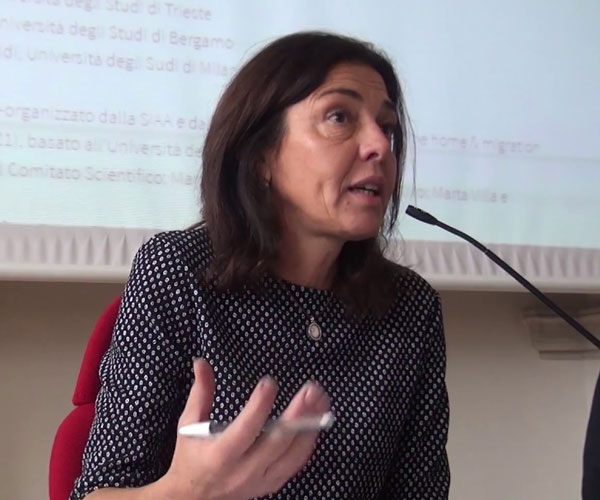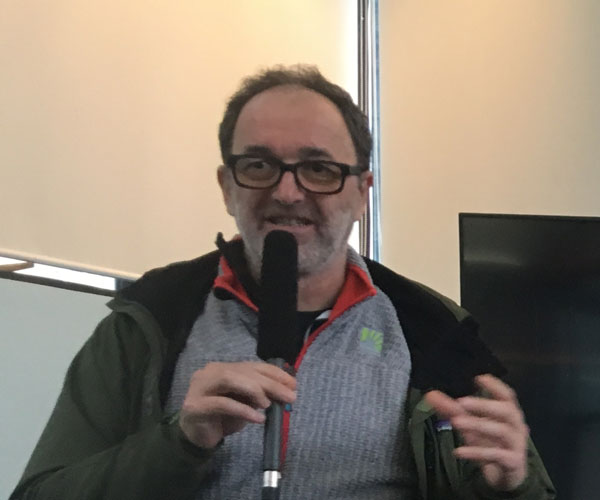
Scientists in flight from war, arriving in a new country, are neither a burden nor a problem. Rather, they are a useful resource for their hosting countries because they bring skills and new perspectives, and are grateful for an opportunity to share their expertise with the institutions that offer them a new temporary home.
At an event organised by the University of Trieste Department of Human Sciences and TWAS in Trieste, Italy, experts urged institutions and decision-makers to capitalize on the scientists' knowledge. This provides local benefits, they said, while for scientists themselves, it is an opportunity to preserve their education and build their careers while they wait to return home.
 "Trieste has the potential to address and provide solutions to a thorny issue like 'how shall we help scientists displaced by war?'", said Roberta Altin, an associate professor of cultural anthropology, and the local coordinatorof the Center on Migrations and International Cooperation for Sustainable Development (CIMCS), at the University of Trieste.
"Trieste has the potential to address and provide solutions to a thorny issue like 'how shall we help scientists displaced by war?'", said Roberta Altin, an associate professor of cultural anthropology, and the local coordinatorof the Center on Migrations and International Cooperation for Sustainable Development (CIMCS), at the University of Trieste.
She cited the role of 10 international and Italian science institutions from Trieste and the Friuli Venezia Giulia region that endorsed a 2018 accord to seek research and study opportunities for scientists forced to flee from war and conflict. The accord is an example of collaboration that confirms how the region's scientific institutions have a experience in science diplomacy which allows them to play an international leadership role.
Altin was the chair of a public event on displaced scientists at Stazione Rogers in Trieste on 10 April. The event featured local researchers, including one from Yemen, and offered an audience of scholars, students, and professors the opportunity to watch TWAS' s documentary "Science in Exile", a 37-minute film about four scientists fleeing from war-torn nations, and to discuss the scientific and social issues raised by the researchers' experiences.
Film director Nicole Leghissa of Trieste shared with the audience her insights about the making of "Science in Exile. The film tells the story of four scientists fleeing from war-torn countries – Syria, Yemen and Iraq. The film was produced in 2017 with a contribution from the Swedish International Development Cooperation Agency (Sida), and since its premiere in late 2017, has screened in more than two dozen countries at major research centres, science film festivals and universities.
"Giving voice to scientists fleeing from wars, who otherwise tend to go unnoticed, is the vision that has supported the idea behind this documentary," explained Leghissa.
Finding four scientists willing to tell their stories was not an easy task, she recalled. "I had to spend some time with them, in their communities, in order to breach their distrust and fear," she explained.
The film offers an insight on the hidden dimension of scientists who risk their lives at home because of political instability and wars, and then leave everything behind to seek a new life and opportunities. According to the United Nations Refugee Agency (UNHCR), currently there are around 69 million forcibly displaced people worldwide. By one assessment, there may be 10,000 or more scientists, engineers, medical professionals and advanced science students who have fled from recent conflicts in the Middle East; thousands of others have left Venezuela in recent years.
 But how can scientists access the resources and networks to start a new life abroad? Matteo Marsili is a physicist at the Abdus Salam International Centre for Theoretical Physics (ICTP) in Trieste who helped to develop the local initiative. "There are several international networks and associations, such as the Scholar Rescue Fund, which provide valuable help in terms of money and organization," Marsili explained. "We'd like to do more. At the moment we use funds allocated to research to help these people, because we still have no dedicated funding for this programme."
But how can scientists access the resources and networks to start a new life abroad? Matteo Marsili is a physicist at the Abdus Salam International Centre for Theoretical Physics (ICTP) in Trieste who helped to develop the local initiative. "There are several international networks and associations, such as the Scholar Rescue Fund, which provide valuable help in terms of money and organization," Marsili explained. "We'd like to do more. At the moment we use funds allocated to research to help these people, because we still have no dedicated funding for this programme."
Amer Al-Qaaod, a researcher in nuclear physics from Yemen, was selected for a fellowship at the Abdus Salam International Centre for Theoretical Physics (ICTP) in Trieste. Al-Qaaod is a native of Sa'dah city in northwestern Yemen. He left his country in 2017 due to the war that has destroyed his university.
"I decided to leave Yemen because I felt it was too dangerous for me and my family," he explained. Threatened with arrest, and no longer able to carry out his research, he first moved to Egypt, then to Italy, in 2018. Already familiar with ICTP, Al-Qaaod settled in Trieste and started a new life, thanks to an award from the Institute for International Education-Scholar Rescue Fund, a US-based programme that funds fellowships for threatened and displaced scholars at partnering higher education institutions worldwide.
"In Trieste I can do research, participate in workshops and have a better life with my family," he said. Of course he thinks of returning home, but "until the situation gets better," he added, "I need to prioritise our safety and well being." Living in Trieste also gives him the opportunity to strengthen his scientific education working at a top-class international research centre.
Cristina Serra

